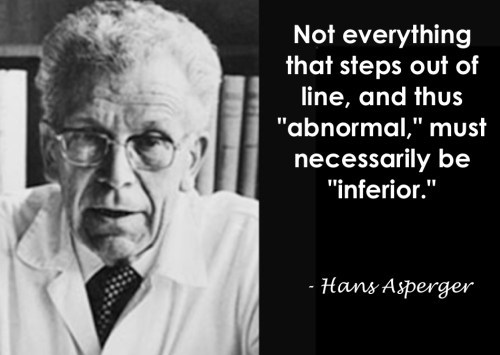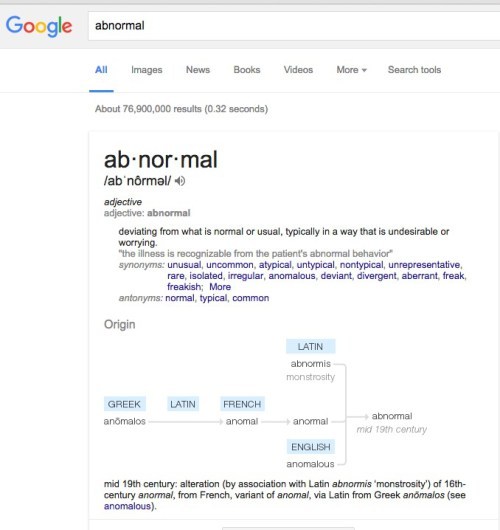Casting Aspergians
Thinking today about this graphic I used the other day…

… and how Hans Asperger felt it necessary, especially as he was living in the shadow of the Nazi regime, to argue that “abnormal” should not automatically mean “inferior.”
It was necessary, because while the word technically or originally means “deviating from what is normal or usual,” it also comes, in the dominant global worldview, with the strong flavor of “typically in a way that is undesirable or worrying.” (We could also go after the word “deviating,” couldn’t we?)

You can easily see that at work in this culture, famously depicted in this clip from Young Frankenstein, in which the humor depends on the assumption that “abnormal” means “monstrous.”
The association of “abnormal” and “inferior” makes perfect sense, of course, from the vantage point of a culture that sees things in terms of materialism, genes, and DNA, where the old story is that most mutations are harmful, even if it’s probably more true to say that most are neutral, some are harmful, and some are beneficial.
It also seems to align with the old and related notion (encountered, if memory serves, in the Bible, and in ancient Egyptian thought, and in the Arthurian Legends) that the health of the land, the people, or the nation is directly related to the health of the leader or king, and that leaders who are wounded or sick or deformed should no longer lead. (I’d love some specific references to this notion, if any of ya’ll have some.)
But it contrasts with what I’ve read about some cultures, in which “abnormalities” such as epilepsy, bodily deformations, or schizophrenia can be indicative of special powers and gifts, and can put “abnormal people” into important, yet “fringe,” positions, such as the shaman, sorcerer, or spiritual leader. (Specific references to this would also be appreciated.)
All of which is fascinating to me, of course, and of some import, not only because I’ve spent much of my life feeling “abnormal” and “deviating from the norm,” but because now, as I explore this subject of Asperger’s in order to throw light onto my experience, I find myself taking on a label which comes with its own suite of associations, many of them seasoned with the flavor of “inferior.”
As a result of these feelings of abnormality, I’ve often felt the need to assert my right to be who I was, and have crawled as far out onto the limb as I might, trying to find a safe spot from which I might view the whole tree.
And it’s amazing to me that, even now, when I write a post about Aspergers, and my experience of it, I hesitate before I mash the “publish” button, and wonder whether it’s a good idea. Writing about Aspergers focuses on the differences, and fails to balance those differences with the many ways in which the “autism spectrum” is simply a small portion of the larger “human spectrum,” and does not necessarily acknowledge the kinship and solidarity of all who experience a human life.
The word “Asperger’s” is so helpful to me that I feel compelled to speak it. But I would prefer that it not create more distance. It’s already shaky enough, out here on the end of my thin branch.
Enough for now. Time. To. Mash. The. Button…
The post Casting Aspergians appeared first on Everything is Research: Life, Asperger's, and the Written Word.

Everything is Research: Life, Asperger's, and the Written Word
- Timothy Scott Bennett's profile
- 8 followers



